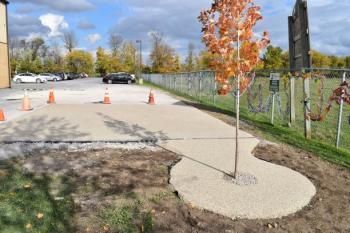SNC Leads Way in Low Impact Approaches to Development

Over 120 regional municipal staff, engineers and Conservation professionals attended a first of its kind Eastern Ontario Training Conference in Ottawa from November 7 to 9 to learn more about the sustainable green infrastructure practice known as Low Impact Development (LID).
LID is a stormwater management strategy that mitigates the impacts of increased runoff in urban areas and stormwater pollution by managing runoff as close to its source as possible.
Some examples of LID include permeable pavements, rainwater harvesting and grass swales; all of which can reduce the risks of flash flooding in communities and can improve water quality and habitat by minimizing pollution.
Currently the Provincial Government is developing guidelines for LID, and an increasing number of municipalities are embracing LID projects in their communities.
The sold-out Conference was hosted by Ottawa’s three regional Conservation Partners: South Nation Conservation (SNC), Mississippi Valley Conservation and the Rideau Valley Conservation Authority, Sustainable Technologies Evaluation Program (STEP), the City of Ottawa, with support from Natural Resources Canada.
Participants were taught a range of topics including LID design, cost, construction, implementation and maintenance by STEP instructors and LID experts Bill Trenouth, Jen Hill and Dean Young who have LID experience in Southern Ontario.
“We’re hoping that our colleagues will walk away with some new ideas in mind for future LID projects,” says Sandra Mancini, SNC’s Engineering Team Lead.
At its head office in Finch, SNC recently installed a permeable parking lot which will also serve as a regional LID demonstration site. The permeable pavement used in the project allows the rainwater runoff to infiltrate into the ground rather than having it flow to into a nearby storm pond. Funding was received through the Great Lakes Guardian Community Fund.
“LID projects can visually, economically and environmentally benefit the communities in which they are implemented,” explains Mancini. “Rather than having rainwater pour off your driveway and flood your street or your yard, it can get soaked through permeable pavement and into the ground.”
FOR MORE INFORMATION: Taylor Campbell, SNC Communications Specialist, 1-877-984-2948, ext. 296, tcampbell@nation.on.ca.
###

